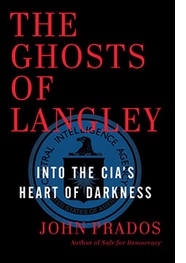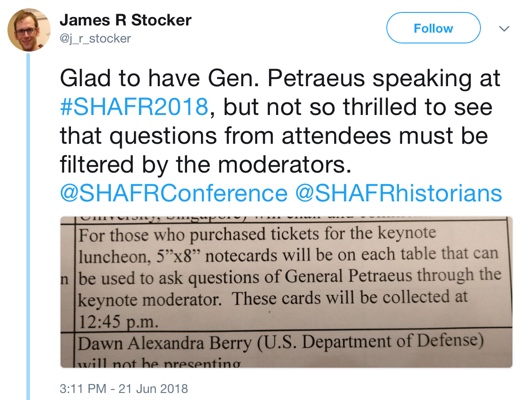Shouldn’t Historians Be Free to Ask Important Officials Tough Questions?
Most historians are familiar with a dilemma that journalists often complain of. Access versus reporting. You cozy up to the subject, try to get close, hope the contact yields some new insider information. If the journalist gets that far, stage 2 follows—do you use the information (which might compromise the source), and if so do you utilize the material in ways that protect the source. This has been a headache in press circles at least since I was in high school and assistant editor of my school newspaper. A read of today’s newspapers and newsmagazines, replete with anonymous sources and written-over information, quickly reveals the problem still exists.
 Historians turn out to have a similar problem, illustrated recently at the annual meeting of one of our premier professional associations, the Society of Historians of American Foreign Relations (SHAFR). Except for the lucky ones of us who get to study the early Republic or other periods that are truly in the rear-view mirror, the historian faces an access problem similar to that of the journalist. At its annual meetings SHAFR has attempted to deal with that problem by inviting keynote speakers who are often figures in important events of the day, or the past. This year’s SHAFR took place in late June and the historians’ dilemma was in evidence there.
Historians turn out to have a similar problem, illustrated recently at the annual meeting of one of our premier professional associations, the Society of Historians of American Foreign Relations (SHAFR). Except for the lucky ones of us who get to study the early Republic or other periods that are truly in the rear-view mirror, the historian faces an access problem similar to that of the journalist. At its annual meetings SHAFR has attempted to deal with that problem by inviting keynote speakers who are often figures in important events of the day, or the past. This year’s SHAFR took place in late June and the historians’ dilemma was in evidence there.
The association’s president invited General David Petraeus, who he had seen the previous year in Columbus, Ohio, to speak to the SHAFR meeting. Petraeus had been a division commander, a training command leader, and then top commander in Iraq, then Afghanistan, during our recent wars there, as well as director of the Central Intelligence Agency. He was a principle in the revision of the Army’s standard field manual on counterinsurgency. But the good general was carrying baggage too. In these days of the Russian Caper, Petraeus had lied to FBI agents questioning him, and was vulnerable to prosecution under the Espionage Act for leaking classified information to his mistress. Some of the potential charges were the same as apply to Paul Manafort, Michael Cohen, and others of that crew today. The general had been forced to resign from the CIA in November 2012 for the affair. Petraeus could have been charged with a felony. That he was not was entirely at the discretion of Attorney General Eric Holder, who met with—wait for it—Jamey Comey to review the evidence before offering Petraeus a plea deal. The general pleaded guilty to a misdemeanor charge in 2015 and received probation plus a $100,000 fine.
Apparently this did not matter to the SHAFR president. But it did to members. Nearly 150 historians signed a letter to SHAFR leadership protesting the selection of Petraeus for conference speaker, in good time for the organization to have made alternate arrangements. The Society’s response was wooden. It offered to add an event, a roundtable discussion of counterinsurgency, to the conference proceedings. Dissenters rejected that idea as simply contributing to the issue. Leadership then announced that Petraeus, who was already being accorded the advantage of bringing in his own person to moderate the event, would take only written questions.
I think that SHAFR, at that point, showed itself in bed with the general. The underlying problem is the access dilemma, just as with the journalists. Historians approach these events as experts looking for an inside view. But the subjects see the professional organization as affording them a bullhorn to put out whatever message they would like. As a case in point SHAFR had been through this same thing before. Richard Armitage in 2002 had addressed the group and told us of the Bush administration’s careful planning for an occupation of Iraq. Of course it turned out that the White House and Pentagon weren’t listening to State and all those careful plans went out the window, but at least Armitage was telling us the truth. For every truthsayer there are two (or more) opportunists. Not long afterwards SHAFR had Paul Wolfowitz at the annual meeting, which amounted to an objective organization giving an administration flak the megaphone. Then we had John Yoo to tell us torture was all legal. Talk about CIA, we had Director Michael Hayden with the carrot and the stick—the carrot that the agency was releasing the long-secret CIA “Family Jewels” but—the stick—the CIA would systematically deny access to the “President’s Daily Briefs” claiming they were “pre-decisional documents.” There were a number of PDBs already declassified so we knew that was not true. Tell that to a roomful of historians and the speaker is going to face questions. Hard ones. With follow up. That was precisely the problem with letting David Petraeus choose among written questions selected by his personal representative.
It was when I heard about the written questions that I myself sent something to SHAFR. I went back through this dubious history. Leadership had a four-bobble error going. Not learning from the numerous episodes just mentioned. Not responding effectively to the complaints of a substantial fraction of the Society’s membership. Inviting a person with the general’s particular transgressions in the #MeToo movement. Now, yielding to Petraeus the complete ability to set the direction of the conversation. Then I said that the SHAFR business meeting needed to pass a resolution providing an explicit policy for the selection of invitees and for ground rules to apply to all such events—that last part in italics. The leadership’s official response to my message was, “Thank you for your feedback.”
The Society’s board, however, did discuss these matters at its business meeting. SHAFR informs us, in a June 30 message from the outgoing president, of the text of the “policy” it adopted: “Council approves the principal of presidential appointments of keynote speakers and affirms SHAFR’s tradition of promoting scholarly engagement and exchange with all such speakers.”
In decades of participation in this professional association I have never encountered such wooden-headed obtuseness. First, there is no “scholarly engagement” with a speaker who is deciding which questions he will take and which not. Second, there is no “promoting” such an exchange if the speaker has his own moderator. Third, the resolution, in fact, expresses no policy. Should invitations be open to anyone? Only sitting government officials? Only past government officials? Two years out? Three years out? What about think tank analysts? PAC presidents? Other political activists? What about officials of the fifty states, especially (in this case) ones that have significant foreign involvements. Can a historian be the keynote speaker? Should past legal or criminal entanglements affect the choice of speaker? Certainly there needs to be a rule that the professional association will provide the moderator and control the questioning—and that the speaker will be required to take questions from the floor.
These things need to be on paper. When the historian is in bed with the source, danger is abroad. Policy aims to minimize that prospect. David Petraeus told us the Iraq war was lost when the U.S. occupation failed to protect Baghdad against looting. The premature dismissal of the Baathists was a big mistake. If that is news it says more about the listener’s level of knowledge than anything else. If Petraeus had said he recommended x in a memorandum, on y day, and that is why Baghdad was not garrisoned, plus a questioner could bring out how Donald Rumsfeld and Paul Wolfowitz had responded to the suggestion—that would have been a scholarly exchange. It should not—especially after numerous previous snafus—require more controversy for a professional association to articulate measures to keep historians and their sources out of bed.
